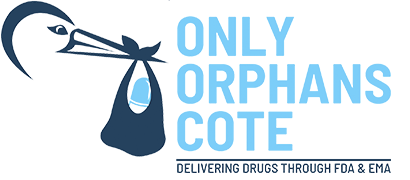Orphan Drug Designation FAQ
You Have Questions. Dr. Cote has the answers.
At Only Orphans Cote, we are committed to supporting biotech and pharmaceutical companies as they develop orphan drugs for patients with rare diseases. These FAQs are intended to respond to some of the questions that we receive at biotech conferences and meetings with potential clients.
For additional questions, please contact : tina@onlyorphanscote.com and eric@onlyorphanscote.com
What is an orphan designation?
Orphan designation is typically the very first interaction that a biotech company developing a drug for a rare disease will have with FDA or EMA.
When can a biotech company apply for orphan designation?
A company that is able to demonstrate "promise" that its drug is effective for treating a rare disease or condition using clinical data or data from animal models of the human rare disease, can submit an application for orphan designation to the FDA or EMA.
Does early application for orphan designation matter?
Biotech companies can reap more value from submitting their applications sooner rather than later for the following reasons:
1. Early application increases the asset’s value, thus improving the terms sheets a biotech company can expect with potential investors.
2. Once orphan designation is received, a biotech company can collect tax credits for clinical trial expenses incurred in the USA. These tax credits likewise impact term sheets with investors.
3. Receiving FDA or EMA orphan designation demonstrates a company's competence in regulatory interactions and enhances the credibility of its drug development program.
What are the benefits of orphan designation?
According to the 1983 Orphan Drug Act, companies that received orphan drugs designations are entitled to:
1. Market exclusivity for seven years following marketing authorization. This means you and you alone can market your product for the treatment of the designated rare disease. This form of market protection is better than a patent because it relies upon the FDA's promise in contrast to the uncertain success of patent attorneys (not sure what that means. May need better phrasing). This strong exclusivity has yielded high price points for orphan drugs (median 100,000 USD per patient per year).
2. Eligibility to receive tax credits upon orphan designation, underscoring the importance of early application.
3. Exemption from the PDUFA Fee. This can yield roughly 3.5 million dollars in savings.
4. Exemption from the Pediatric Research Equity act (PREA). The complications of pediatric drug development can be substantial.
Are there any additional benefits beyond those legally stipulated by the 1983 Orphan Drug Act?
Historically, orphan drug development requires fewer clinical trials and their approval pathways can be faster provided they meet eligibility criteria and follow the appropriate regulatory pathway.
Prior to 1983, there were only 12 drugs for patients with rare diseases. By 2024, more than 1,200 have been approved.
What's the estimated timeline for orphan designation with regulatory advice from Only Orphans Cote?
It takes on average 3 weeks to finalize an application and 3 months for the FDA to review it. We typically budget 10 months for EMA applications to meet their process requirements which are different from the FDA's.
Do I need clinical data for orphan designation?
No! Animal model data of the human rare disease in animals who received your product showing evidence of change such as smaller tumors, longer survival rates, better histology at necropsy, among others) compared to diseased animals who did not receive the orphan product are 100% satisfactory.
Why should you hire Dr. Tim Cote as your orphan regulatory expert?
As the previous director of the Office of Orphan Products (OOPD), Dr. Cote was the final authority deciding the fate of 1,400 orphan drug designation applications. Like his predecessors and successors, roughly 30% of all first-time applicants were designated. With repeated resubmission, this number gets up to a little better than half of all applicants.
In contrast, from his regulatory consulting office, more than 90% of all applicants are awarded. Why? Not because he receives any special treatment from his past employees, no. Rather, he will only accept clients who are as committed to success in developing their orphan products as the Only Orphans Cote team is in acquiring orphan designation . His advice and our team's support guides clients throughout the regulatory process in writing an application that meets approval requirements. Basically, Dr. Cote offers his clients access to his unique experience as a trusted advisor who shares their ambition to develop drugs for patients with rare diseases.
How long has Dr. Cote been working with biotechs on orphan drug designations?
In the conduct of two consultancies over 8 years, Dr. Cote has personally written over 800 orphan designation applications, certainly more than anyone else on the planet. While it’s certainly possible to prepare an application yourself or work with less experienced consultants, the reality is that quality makes all the difference. Without orphan designation, every other dollar spent on drug development is at risk. If you want the process handled correctly and at a fair price, Dr. Cote is the right choice.
How much does it cost to talk to Dr. Tim Cote?
Our initial 30-minute conversation is free. We love to advise, to teach, and share perspectives. Beyond that, our business model is to charge for tangible products (i.e. written applications) that advance our client’s assets value, typically by 10x to 100x our fee for these written deliverables.
How is orphan designation in Europe different from the orphan designation in the US?
Orphan drug designation in Europe is quite different from the U.S. process. The European application is roughly three times longer, must address four criteria (compared to two for the FDA), and follows a multi-stage process that includes application validation, pre-submission meetings, and ultimately an opinion from the Committee on Orphan Medicinal Products (COMP). The full process typically takes about 10 months.
Dr. Cote’s extensive experience includes years of direct collaboration with COMP during his time as Director of the FDA’s Office of Orphan Products Development, as well as submitting more European designation applications between 2012 and 2017 than any single European entity. Today, Only Orphans Cote continues to bring that depth of expertise to clients navigating the European system.
Does Only Orphans Cote offer other services beside orphan designation?
Absolutely! Half our work is orphan designation both at FDA and EMA, the other half is getting orphan drugs through the review division as marketed products; Pre IND Meeting, Type A/B/C/D Meetings, Breakthrough Therapy Designation, Fast Track Designation, INTERACT Meetings, OOPD Meetings, IND Submission, QIDPD, RMAT. At Only Orphans Cote, we do everything to get your orphan drug licensed and marketed in the US.
What is the Rare Pediatric Disease Designation (RPDD)?
The Rare Pediatric Disease Designation is an affirmation by FDA that in the event a company receives marketing authorization of its product for the treatment of a pediatric rare disease, the company will indeed receive the Priority Review Voucher (PRV). The PRV is a special incentive because they market for roughly 100 million dollars. Therefore, the RPDD likewise increases your asset’s value because it demonstrates to your investors that upon marketing, a revenue stream can be expected not only from drug sales but also from this important one time sale of the PRV.
How is Fast Track Designation different from Breakthrough Therapy Designation?
Fast track Designation is a very old - at least 3 decades - system of administrative expediency which FDA extends to products with an unmet medical need. While it is only available for products that have an open IND, no clinical data per se is required for applying for fast track designation. The review of applications for fast track designation is fairly criteria-based and therefore award of this designation is reasonably predictable and more often than not, positive.
In contrast, Breakthrough Therapy Designation is a much newer system that embraces all the benefits of Fast Track Designation and awards extra support in the form of extra meetings and interdisciplinary meetings. Breakthrough Therapy Designation requires the submission of clinical data that identify exactly why this therapy offers a breakthrough in comparison to currently available therapies. The award of Breakthrough Therapy Designation expounds upon breakthroughs criteria, which can be difficult to interpret by many and will require an expert guidance to enhance its chances of success against what many describe as a highly subjective guidance by existing processes. A minority of Breakthrough Therapy Designation applications are awarded the designation and an award is quite unpredictable. Nevertheless, companies that receive breakthrough therapy designation benefit greatly as the biotech marketplace recognizes the value of FDA’s affirmation of “breakthrough-ness”. Retrospective studies have demonstrated that recipients of Breakthrough Therapy Designations are faster to the clinic, faster through the clinic, and more likely to be rapidly acquired by other pharma companies.
I see you have a big team. Who would be the primary contact for a biotech?
Dr. Cote is the primary point of contact for every client. He is well supported by a team of business development associates and regulatory affairs associates who manage the administration of meetings and contracts, and the drafting of manuscripts, respectively. However, all critical work is overseen directly by Dr. Cote. Every word submitted is his responsibility, every meeting is with him, and your success is placed in his hands. Clients can count on his personal attention and accountability throughout the process.

